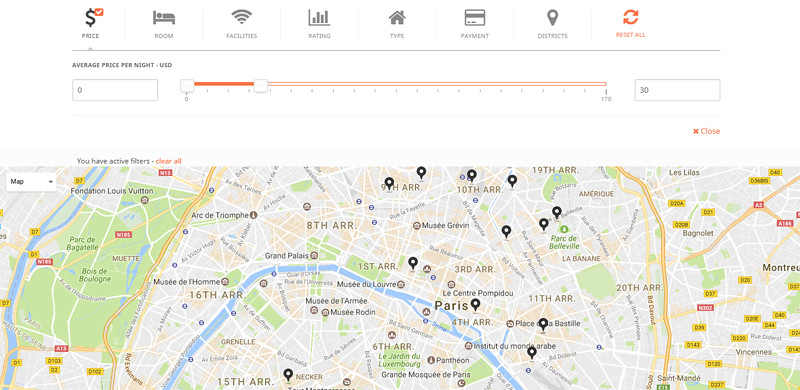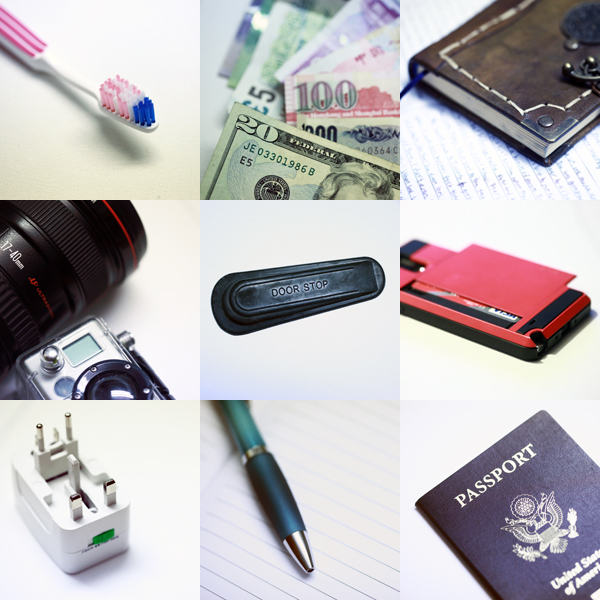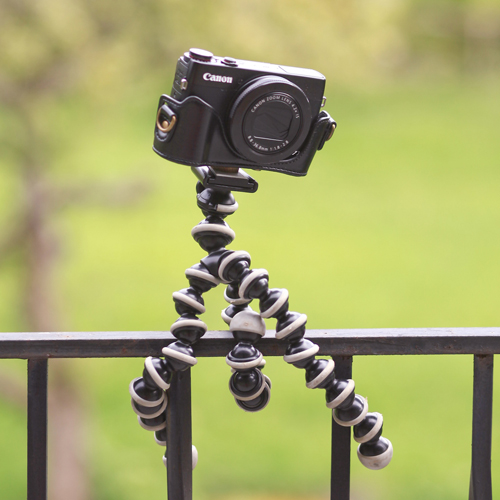So first of all, what exactly is a Hostel?
Think of it as a cheaper, self-catering hotel with many different options to fit your needs and your budget. Staying at a hostel doesn’t always mean you have to share a room with strangers. Here are the different types of rooms:
Dorm Rooms
These are the room types hostels are known for. These are the rooms where you will be sharing with strangers, unless you are traveling with a group of friends big enough to fill up the room to yourselves. The number of beds in a dorm room depends on the hostel since every hostel is different, but most start with 3 beds and can go up to as much as 18 beds or more! There are different bed types too. Some hostels will have single beds, some with double bunk beds, some even have triple bunk beds (getting the middle bunk is like getting the middle seat on an airplane…), and sometimes the bunk beds have curtains for added privacy so you don’t have to worry about anyone staring at your angelic face as you sleep.
Also remember, you are paying for the bed, not the room, which is why hostels are cheaper than hotels. The more beds in a room, the cheaper it will be!
Mixed/Co-ed Dorms
- Every hostel has these rooms. These are the dorm rooms that any gender can stay at and are the cheapest.
Female Dorms
- Not all hostels offer these kinds of rooms, but they are very common. If you haven’t figured it out already, yes these are rooms for females only (sorry boys!). Why? Because girls have more to worry about than boys when they travel, especially when traveling alone. Although most boys will behave in the co-ed dorms, sometimes a girl just doesn’t want to deal with the paranoia of sleeping in a room full of boys they don’t know. These rooms cost a little bit more than the co-ed rooms and are usually about $1-3 more.
Male Dorms
- Sometimes hostels even have male only rooms – because equality! But these are not as common. I assume because boys don’t worry about the same things as girls.
Private Rooms
Private rooms are basically like hotel rooms. You get a room to yourself that usually comes with one or two beds. Like I stated above, the more beds in a room, the cheaper it will be, so that means private rooms will cost the most in a hostel! But if you are traveling with a group, you can also contact the hostel to book a whole dorm room as your private room.
Bathrooms
Again, just like dorm rooms, bathrooms are different depending on the hostel. Some hostels have en-suite bathrooms, meaning each room has its own private bathroom, and some have shared bathrooms that everyone at the hostel uses. Even the shared bathrooms vary. Some shared bathrooms have both a toilet and shower inside and some may be separated to just a shower room and just a toilet room, which in my opinion, is more convenient because if someone is taking a shower, they are not hogging the toilet as well. Shared bathrooms come as single rooms with locks and some bathrooms are locker room style, meaning there will be multiple stalls of showers, toilets, and sinks — so less waiting! Bathrooms will sometimes be co-ed and some may be separated to females only and males only.
How to Book a Hostel
The easiest way is to either go to Hostel Bookers or Hostel World where you can search and read reviews. My favorite way of searching is using the map display instead of the list, so I can see which hostels are walking distance to the sights I want to see or how close they are to Metro and train stations. It can be overwhelming to see all those hostels fill up the map, but you can filter it by price, room type, facilities, ratings, etc. to fit your needs and narrow down your search.

If you think you like the location of a hostel, you can hover over it on the map and the hostel name will pop up along with its rating and price. Click on the pop-up bubble and it will take you to the hostel’s page where you can learn more about it, read its reviews, and look at photos.
How to Choose a Hostel
Everyone’s needs are different, so I can’t give you any actual advice on which hostel to choose, BUT I can give you some questions to ask yourself.
- Do you want to party and be social? Or do you want to stay somewhere quiet and get some rest?
- Is the hostel close to landmarks you want to see? Or close to public transportation?
- Is the hostel in a safe area for you to walk back to by yourself at night?
- Is the hostel easy to get to from the airport, train station, or port?
- What free facilities does the hostel provide? Wifi, lockers, breakfast, towels, etc?
- Does the hostel provide tour or shuttle bookings?
- Is the front desk open 24 hours?
- Is there a communal area to meet other travelers?
- Is there an onsite restaurant or bar? Or a kitchen with a refrigerator to cook your own meals?
- Does the hostel have a laundry facility?
- Does the hostel have private or shared bathrooms?
- How clean is the hostel? Does it get cleaned everyday?
- Most importantly: does the hostel have good reviews?
Do you have an absolute must? Mine are free wifi, personal lockers, and cleanliness! Remember, read. the. reviews.
What to Bring for Hostels
If you are traveling long term, it’s a good idea to bring your own towel. Sometimes hostels will provide towels for free, but some will have a fee that will range from $1-3. You should also bring your own padlock if you plan on keeping your valuables in a personal locker. Many dorms will have personal lockers assigned to you in your room for you to keep your valuables in. Some hostels will provide a key for you, some use digital key cards to open, and sometimes you need to have your own padlock for your locker. If you don’t have your own, you can rent one from the front desk for about $1-3, so renting towels and padlocks will add up if you’re staying at multiple hostels.
Most of hostels won’t provide the usual amenities that hotels have, like shampoo and soap, so remember to bring your own! It’s also a good idea to bring either flip flops, open toe shoes, or some sort of easy to slip on shoes to wear to the shared bathrooms so your feet won’t get icky after taking a shower. The floors will be wet!
If you are a light sleeper, be sure to bring ear plugs or headphones to drown out the noise and an eye mask in case someone in your room turns on the light while you’re sleeping.
What Happens During and After Check-in?
Checking in at a hostel is pretty much the same as checking into a hotel, except the hostel staff will feel a little less formal and feel more like a meeting new friend. You’ll need to show your ID/passport of course, and after you’re all checked in, the staff will lead you to your room or give you directions. If you’re staying in a dorm, the staff will either show you your bed or you’ll be given a key and a card with a number on it. That number is your assigned bed, so look for the bed with the matching number on it. Sometimes the beds will have a card holder so you can put your card in it to let other people know that it’s taken. Some hostels won’t even have assigned beds, so you’ll just go into the room and try to figure out which beds aren’t already claimed. Hint: it’s the ones with the nicely folded up blankets and bed sheets. Usually hostels will have the clean bed sheets and pillow cases folded on top of the bed to let you know the bed is available for taking.
So after you’ve made your bed, where do you put your belongings? Do you need to hug your bags as you sleep? No, don’t worry. Most hostels will have personal lockers in the room. Sometimes the lockers are right under or next to your bed or there will be numbered lockers somewhere else in the room that will match with your bed number. No need to worry about anyone stealing your valuables! Remember, not all hostels provide locks for the lockers, so be sure to bring your own.
Do you need to fight for the outlet to charge your electronics? Maybe, but in most cases, no. A lot of beds will have their own outlets, so you can charge your phone and browse the internet as you lay in your bed just like at home. Yay!
After you have made your nest in your room and are ready to go explore, you can go to the front desk to ask the knowledgeable staff for suggestions on where to go and what to see. In most cases (so far for me, it’s been every time), they’ll be more than willing to help. Most hostels have free maps too! From my experience, the staff has always taken the time to circle points of interest for me and have given me public transportation options. Who needs the internet anyway when you have enthusiastic staff that want to show you their city?
I hope this post has been helpful and you have learned a few things about hostels. As a solo traveler, staying at hostels is my favorite option because not only is it much cheaper, but I meet so many like-minded travel lovers along the way. It’s very easy to make new friends and being able to exchange personal tips and suggestions to each other, which is something guidebooks and internet searches can never give us.
Do you have more questions about hostels? Feel free to ask!
email me: diana@globetrottingartist.com
instagram: @dianajlee







Thanks for sharing amazing article!!
Everything is very open with a very clear
description of the challenges. It was definitely informative.
Your site is useful. Thanks for sharing!
Thank you for sharing excellent information 😊